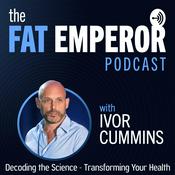614 episodes
- This is a Premium-exclusive episode of the podcast. To listen to the full episode you need to be subscribed to Sigma Nutrition Premium.
This episode examines dietary fiber through the lens of a practical, clinically relevant question: if higher fiber intakes are consistently associated with reduced chronic disease risk, what intake level should we be aiming for to meaningfully improve health outcomes?
The discussion deliberately spans from common online claims that fiber is "not essential" (and therefore unnecessary), through to mechanistic reasoning and the highest-quality evidence we have for hard outcomes and accepted intermediate cardiometabolic endpoints.
Across the episode, we'll hear from six expert perspectives to integrate epidemiology, controlled feeding studies, and clinical guideline contexts.
We will consider how the dose–response patterns, fiber type/source, individual tolerance, and the limitations of nutrition trials all influence what can be recommended with confidence.
Timestamps
[03:51] Addressing the claim "fiber is not an essential nutrient"
[11:23] Carbohydrate quality and fiber
[17:16] Dietary recommendations for fiber
[20:01] Portfolio diet and cardiovascular health
[26:48] Comparing fiber sources
[36:07] Epidemiological evidence on fiber
[41:57] Understanding fiber intake and coronary heart disease
[43:23] Fiber intake and colorectal cancer
[54:06] Diet swap study: south african vs. african american diets
[01:01:47] High fiber diets and diabetes
[01:16:18] Challenges in fiber intake and IBS
[01:21:45] Concluding thoughts on fiber intake
Related Resources
Subscribe to Sigma Nutrition Premium
Go to episode page (with links to mentioned studies)
Join the Sigma email newsletter for free
Enroll in the next cohort of our Applied Nutrition Literacy course #594: Can Muscle Still Adapt Positively When Training Under Low Energy Availability? – Jose Areta, PhD
10/2/2026 | 49 mins.Dr. José Areta and colleagues recently carried out a human intervention study examining how a pronounced, short-term energy deficit interacts with an aerobic training stimulus to shape endocrine, metabolic, and skeletal muscle proteomic adaptations.
The core premise is that "low energy availability" is often discussed in a largely unidirectional risk framework, yet human physiology evolved under intermittent energy scarcity, and therefore adaptive responses may be more nuanced than "energy deficit equals impaired adaptation."
The study used tightly controlled diet and exercise, repeated muscle biopsies, and dynamic proteomic profiling to quantify both abundance and synthesis rates of hundreds of individual muscle proteins. This enables a more granular view of "muscle quality" and phenotype than traditional bulk muscle protein synthesis measures.
The findings were incredibly interesting and could have implications for how we view the impact of energy deficits and exercise response.
We discuss the implications for athletes who routinely encounter transient within-day or multi-day energy deficits, for weight loss contexts, and for broader questions around healthspan and ageing biology.
Timestamps
[02:27] Guest introduction
[03:28] Research background and study design
[12:18] Study findings: weight loss and endocrine responses
[15:47] Muscle adaptations and proteomic analysis
[21:47] Interpreting the results: evolutionary and practical implications
[26:57] Mitochondrial proteins and muscle adaptation
[28:44] Energy deficit as a stressor
[34:26] Case study: female tour de france athlete
[40:20] Implications for clinical populations
[41:44] Future research directions
[46:48] Key ideas segment (Premium subcribers only)
Related Resources
Go to episode page (with links to studies)
Join the Sigma email newsletter for free
Subscribe to Sigma Nutrition Premium
Enroll in the next cohort of our Applied Nutrition Literacy course
X: @jlareta#593: Can We Define Hyper-Palatable Foods? And Is Processing Actually the Problem? – Tera Fazzino, PhD
03/2/2026 | 51 mins.While the term "hyperpalatable" has been used frequently for considerable time to refer to foods that are so appealing and tasty that they drive overeating, this term hasn't been well-defined nor has there been a universal standard for what it means.
One researcher who set out to create an objective definition for hyper-palatable foods (HPFs) is Dr. Tera Fazzino. Using specific defined thresholds of sugar, fat and salt combinations, Dr. Fazzino and colleagues have looked at the impact of consumption of these HPFs.
In this episode, we delve into defining HPFs and their nutrient profiles, whether they have addictive-like properties, how HPFs differ from (and overlap with) ultra-processed foods (UPFs), the mechanisms by which these foods drive overconsumption, and the broader public health implications.
Tera Fazzino, PhD, is an associate professor of psychology at the University of Kansas. Her research focuses on addiction, obesity, and eating-related behaviors.
Timestamps
[03:39] Interview begins
[05:05] Attempting to define hyper palatability
[10:03] Nutrient combinations in hyper palatable foods
[14:54] Prevalence of hyper palatable foods
[17:43] Debate on ultra processed foods
[30:02] Mechanisms behind hyper palatability
[35:06] Addiction theory and hyper-palatable foods
[43:38] Early exposure and long-term effects
[50:53] Key ideas recap
Related Resources
Go to episode page (with links to studies mentioned)
Join the Sigma email newsletter for free
Subscribe to Sigma Nutrition Premium
Enroll in the next cohort of our Applied Nutrition Literacy course#592: How Much Protein is Actually Healthy? – Eric Helms, PhD & Matt Nagra, ND
27/1/2026 | 1h 26 mins.In this episode, the discussion turns to a deceptively simple question that sits at the centre of countless nutrition debates: how much protein do we actually need?
On one side, there are confident claims that very high protein intakes are not just beneficial but essential for maximising strength, performance, and muscle mass. On the other, equally strong assertions that the current RDA is entirely sufficient for most people, and that going beyond it is unnecessary or even harmful.
Dr. Eric Helms and Dr. Matthew Nagra work through what the evidence actually tells us when we step away from slogans and thresholds. What does 0.8 g/kg represent, and just as importantly, what does it not? At what point do higher intakes stop meaningfully improving muscle-related outcomes? And where do concerns about kidney function, longevity, and chronic disease fit when we look at long-term data rather than isolated mechanisms?
Rather than treating protein as a single number to defend or dismiss, this conversation places intake in context: training status, ageing, health outcomes, source and optimising for specific goals.
Timestamps
[05:19] Discussion starts
[07:18] Setting the scene: protein intake and health
[09:38] Health outcomes and protein intake
[10:27] Mechanistic measures vs. longitudinal outcomes
[15:47] The RDA: purpose and limitations
[19:19] Higher protein recommendations: where do they come from?
[21:48] Protein intake for athletes and general population
[27:25] Dose response and optimal protein intake
[44:59] Statistical errors in Morton meta-analysis
[46:07] Comparing meta-analyses: Morton, Tagawa, and Nunez
[56:23] Mechanistic claims and protein intake
[59:49] Nitrogen balance and protein requirements
[01:11:55] Protein sources and health outcomes
[01:18:13] Summarizing optimal protein intake
[01:24:31] Key ideas segment (premium subscribers only)
Related Resources
Go to the episode page (with linked studies & resources)
Join the Sigma email newsletter for free
Subscribe to Sigma Nutrition Premium
Enroll in the next cohort of our Applied Nutrition Literacy course
Dr. Helms: MASS Research Review
Muscle & Strength Pyramids books
Instagram: @helms3dmj
Dr. Nagra: Instagram: @dr.matthewnagra
Dr. Nagra's website- Maintaining the ability to carry out everyday tasks and live independently is often described as a cornerstone of healthy ageing. But what actually happens to muscle strength, power, and functional ability as we get older? And how inevitable is their decline?
At what point do changes in muscle function really begin to matter for day-to-day life? Is loss of strength an unavoidable consequence of ageing itself, or does it reflect something more modifiable? If declines are not fixed, what kinds of training or lifestyle interventions genuinely make a difference, and how strong is the evidence behind them?
In this episode, exercise physiologist Dr Brendan Egan examines these questions through the lens of both epidemiological data and controlled training studies in older adults. What do we learn from short-term resistance training interventions lasting just a few months? Do the gains persist once supervised training ends? And what does this tell us about the practical challenges of maintaining functional capacity over the long term?
The conversation also explores the idea of "use it or lose it" in muscle function, the role of resistance training in extending healthspan, and how exercise programmes can be designed to support independence later in life. Ultimately, the episode asks a simple but crucial question: what does the evidence actually say about staying strong, capable, and functionally independent as we age?
Dr. Brendan Egan is an Associate Professor of Sport and Exercise Physiology the School of Health and Human Performance at Dublin City University. Currently, he is Associate Dean for Research in the Faculty of Science and Health.
Timestamps
[03:49] Understanding functional capacity
[05:56] The importance of muscle strength and mass
[14:09] Epidemiology and strength training
[25:07] Concurrent training in older adults study
[31:05] Barriers to strength training in older adults
[34:18] Misconceptions about older adults and exercise
[39:13] Exercise snacking and SBAE
[51:04] Key ideas segment (Premium-only)
Links & Resources
Go to episode page (with links to studies)
Join the Sigma email newsletter for free
Subscribe to Sigma Nutrition Premium
Enroll in the next cohort of our Applied Nutrition Literacy course
More Health & Wellness podcasts
Trending Health & Wellness podcasts
About Sigma Nutrition Radio
Discussions about the science of nutrition, dietetics and health. The podcast that educates through nuanced conversations, exploring evidence and cultivating critical thinking. Hosted by Danny Lennon.
Podcast websiteListen to Sigma Nutrition Radio, Feel Better, Live More with Dr Rangan Chatterjee and many other podcasts from around the world with the radio.net app

Get the free radio.net app
- Stations and podcasts to bookmark
- Stream via Wi-Fi or Bluetooth
- Supports Carplay & Android Auto
- Many other app features
Get the free radio.net app
- Stations and podcasts to bookmark
- Stream via Wi-Fi or Bluetooth
- Supports Carplay & Android Auto
- Many other app features


Sigma Nutrition Radio
Scan code,
download the app,
start listening.
download the app,
start listening.






































